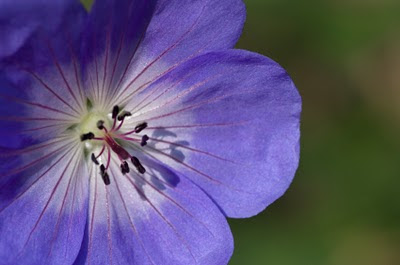 |
| Geranium ‘Rozanne’ |
Below are excerpts from “Plant Patent Potential,”, and article written for Public Gardens by Steve Hutton, president and CEO of The Conard-Pyle Company. You may know his company best for its Knock-Out Roses®. [The Conard-Pyle Company submitted several new varieties of roses for consideration for the 2011 New Varieties Showcase.]
The U.S. Plant Patent Act of 1930 put new and distinct asexually propagated plants on the same plane as industrial inventions in terms of their legal protectability. As with the general utility patent laws, owners of plant patents can prohibit others from making, using, or selling their creations for a period of twenty years from the date of patent application. Since its passing, nearly 21,000 U.S. plant patents have been granted, and there are over 13,000 currently in force. Ornamental plant and fruit breeders are able to charge a royalty [editor’s note: often $.75-$1.50 per plant] to growers who want to propagate, grow, and sell their plants. Funds from these royalties reward breeders for their efforts and enable them to continue their operations.
No plant collected in the wild can be patented. Unique plants that arise from wild-collected seed can be patented, as can their offspring, assuming all international conventions that govern indigenous flora are observed. Sports and mutations of existing varieties found in cultivation are deemed the property of the discoverer and can be patented.
Patenting a new and unique, asexually propagated plant is relatively inexpensive (around $3,000 although it can be as much as $10,000) and easy (it takes about two years from the date of filing to the date of granting).
Dan Heims, president of Terra Nova Nurseries recently made an appearance on Martha Stewart’s show. He talked about plant breeding, finding new varieties for the U.S. market and tissue culture. Here’s the link if you didn’t have a chance to catch the show. Terra Nova Nurseries also submitted several new varieties for the New Varieties Showcase.
DNA testing is a new tool to check plant heritage and enforce plant patents. A recent example of this is the case of Geranium ‘Rozanne’ and ‘Jolly Bee’, two patented hybrid hardy geraniums. From a story that ran in the online April 2010 issue of Horticulture Week:
Dutch grower and breeder Marco Van Noort has lost a EUR200,000 licensing dispute with Blooms of Bressingham North America after DNA testing revealed "virtually no differences" between geraniums marketed by the two companies. Van Noort has agreed to cease trading his 'Jolly Bee' variety, which Blooms of Bressingham NA said was too similar to its Rozanne 'Gerwat' cultivar. The dispute lasted more than seven years since 'Jolly Bee' was granted protection by Plant Variety Rights (PVRs) in 2003, three years after the introduction of Rozanne.

No comments:
Post a Comment